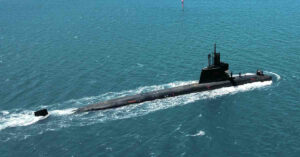
Baltimore Bridge Collapse Considered The Largest Ever Marine Insured Loss To Date
March 29, 2024
Indian Navy Rescues 23 Pakistani Seafarers From Iranian Fishing Vessel Targeted by Pirates
March 30, 2024

Brazil’s government has been undertaking diverse initiatives for the next phase of the PROSUB (Brazil’s Submarine Development Program) as it advances with launching and commissioning the new attack submarines belonging to the Brazilian Navy’s Riachuelo class.
This is proven by the efforts that Brazil’s Ministry of Foreign Affairs has been driving with France, seeking heightened cooperation and support to develop the future nuclear-powered sub-Álvaro Alberto, focusing on a critical aspect: the necessary nuclear fuel to propel the unit.
In comprehensive terms, the PROSUB has set the construction of four new diesel-electric attack submarines as one of its primary objectives.
Built with French assistance, the Riachuelo class is based on the Scorpene submarines from the Naval Group but with more significant displacement and dimensions to satisfy the needs of Brazil’s Navy.
This program’s initial two units have been incorporated into the service, with the contemporary commissioning of the third submarine, Tonelero, while the fourth is at myriad stages of completion.
However, the most ambitious target of the PROSUB is developing a nuclear-powered submarine. Dubbed SN Álvaro Alberto, progress in various aspects is going on. Some factors include the construction of the prototype nuclear reactor for testing, even though the project is clouded in secrecy.
One of the most recent developments has come from Brazil’s Ministry of Foreign Affairs, negotiating with France to boost cooperation that the European nation might offer to the mission.
This was conveyed by Maria Luisa Escorel, the head of Brazil’s Ministry of Foreign Affairs for North America and Europe, who shared that they strongly believe fuel is an area where resistance has existed.
Still, conversations today focus on this possibility: France cooperates in this aspect in light of nuclear energy and fuel. It is a sensitive, strategic, and delicate issue, but the two countries are discussing it.
Until now, about the nuclear submarine Álvaro Alberto, France’s support was based on factors related to the submarine design, including necessary modifications to the hull to house the future nuclear reactor.
But, besides other aspects like fuel, the development was a Brazilian responsibility, being a category in terms of its naval application that poses crucial challenges for the South American country’s current capabilities.
Thus, Brazil’s desire for more cooperation from France could indicate difficulties and challenges the nation encounters in achieving the milestone over the next decade.
Reference: zona-militar
Brazilian Navy Launches Third Riachuelo-Class Attack Submarine, S. Tonelero appeared first on Marine Insight – The Maritime Industry Guide
Source: Maritime Shipping News


